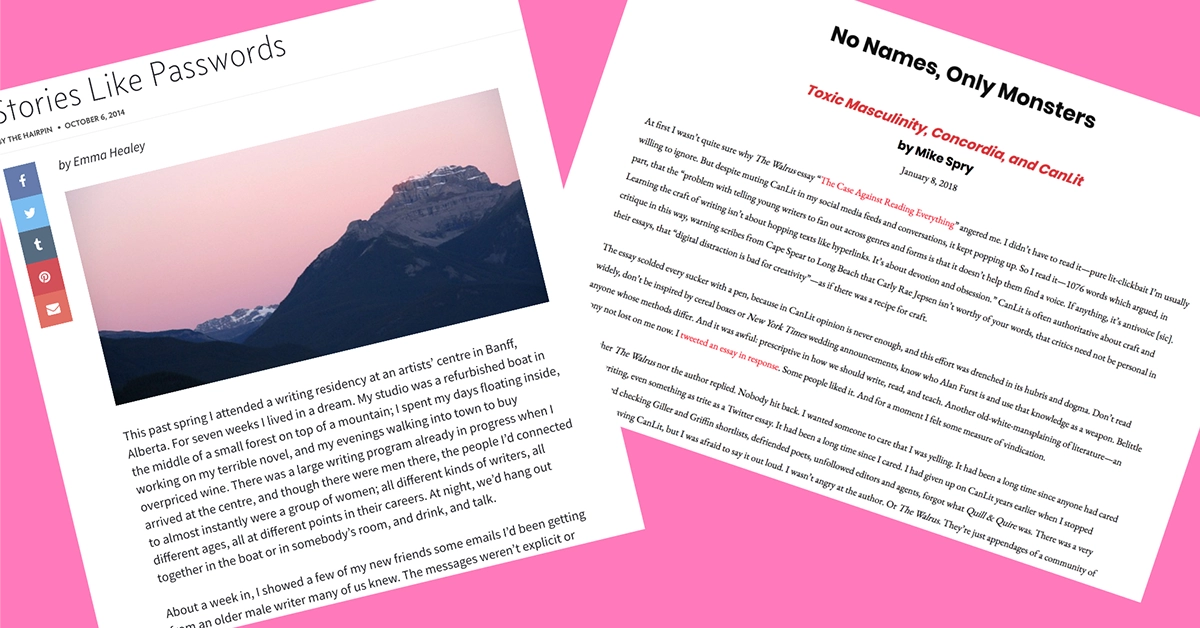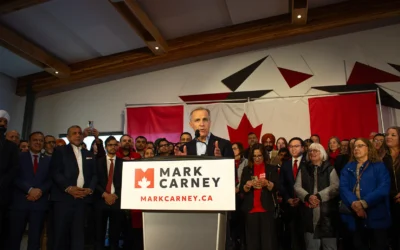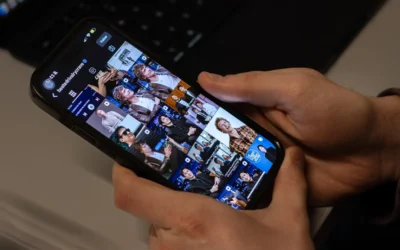Gather ‘round, MacEwan. It’s time for a story.
Once upon a time (October 2014, actually), a woman named Emma Healey published an online article called “Stories like passwords” on hairpin.com, in which she details her experience as a creative writing student at Concordia University, including being sexually assaulted by a professor. This professor, we learn from the article, repeatedly abused his position of power in his relationship with Healey, as well as several others. Following its initial publication, Healey’s piece makes an appearance in The Globe and Mail, but beyond that, no formal action is taken.
Several years later, Mike Spry publishes a similar article titled “No names, only monsters” on canlitaccountable.com. Much like Healey’s, this essay is mostly an exposé of Spry’s time as a student and staff member at Concordia, but it also addresses his experience in the CanLit scene at large. Spry implicates himself as both complacent witness and active participant in inappropriate and downright abusive practices. Some are purely pedagogical, but many of them are sexual. He also directly references Healey’s piece, identifying himself in her narrative and his failure to publicly condemn the professor’s behaviour because he was, in Spry’s words, “a friend.”
Unlike “Stories like passwords,” Spry’s piece immediately garners media attention and a response from Concordia. Whether this is because “No names, only monsters” was published in January of 2018, amidst a wave of sexual misconduct accusations elsewhere in the world, or because it represents the hitherto unheard of male admission that something is very wrong in the CanLit scene is hard to say. Certainly there is a lot to unpack, but hang tight. Our story has only just begun.
In response to the sudden explosion of media around Spry’s essay, Concordia University president Alan Shepard begins to make some public statements addressing Concordia’s position. The earliest of these statements can be found through CBC.
The allegations are to be taken seriously, Shepard says, and this is good. But he also claims that this is the first time he has ever heard of such things happening at Concordia, even though he has been serving as university president since 2012, and despite the fact the English Department received a student letter in 2015 decrying the “toxic” environment — specifically in the creative writing program — for female students.
On the heels of the one-year anniversary of the UBC Accountable controversy, and stoked by Margaret Atwood’s own inflammatory comments, the situation at Concordia has transformed the already smouldering CanLit scene into a raging dumpster fire.
This is not an uncommon story, unfortunately. Nor is it restricted to English and creative writing departments across Canadian campuses, but the imbalance of power in student-teacher relationships is an all-too-common factor.
I love MacEwan University. I love the quality of my education, the small class sizes, the relationships I’ve been able to develop with other students, and so many other aspects of my time here. I have never once felt as though I were anything but safe and respected on this campus, and I have certainly never felt vulnerable in the presence of any of my professors. But even the best of universities can become too comfortable. It is this kind of comfort, the complacent attitude of “if it didn’t happen to me, it can’t be a problem,” that I want us to avoid.
Because it was complacency, as much as complicity, that bred silence when there should have been shouting at Concordia. More than that, it was complacency that transformed students and staff alike into willing bystanders throughout decades of abuse. As the experiences of Emma Healey and countless others tells us, it takes more than simply having a voice to raise awareness about an issue. People have to be willing to listen, too.
So let’s do better, MacEwan. Let us be honest with ourselves and others about any misdemeanors that we might witness, and let us listen when somebody tells us that something is wrong. More than that, let us actually believe them.
We have a responsibility to our staff, to our students, and to ourselves to speak up and keep each other safe. Whether from a pedagogical or purely moral stance, letting figures of authority abuse their position of power is wrong, and has very real consequences on the community and culture of our school.
MacEwan deserves better than what Concordia allowed to fester in its gut. We deserve a better story.
But we have to write it first, and we have to write it together.





0 Comments